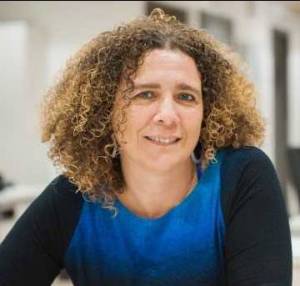[:ca] Anna Pérez-Quintana és professora a la Facultat d’Empresa i Comunicació de la UVIC-UCC des de 1994 i actualment dirigeix el departament d’Economia i Empresa d’aquesta facultat. Doctora en Empresa per la UB, ha centrat la seva recerca en treballs sobre economia feminista, emprenedoria, mercat de treball i carrera acadèmica des de la perspectiva de gènere. Membre del grup Societats, Polítiques i Comunitats Inclusives (SoPCI), ha participat en diversos projectes de recerca sobre emprenedoria social, dones empresàries, ecofeminisme i incorporació de la perspectiva de gènere a la docència universitària. Acreditació de Lectora per AQU. Del 2016 al 2022 va ser directora de la Unitat d’Igualtat de la UVIC-UCC. És co-autora, per encàrrec de la Xarxa Vives, dels dos informes sobre “El biaix de gènere en el reclutament, la promoció i la retenció de personal a les universitats” (2019 i 2023).
Anna Pérez-Quintana és professora a la Facultat d’Empresa i Comunicació de la UVIC-UCC des de 1994 i actualment dirigeix el departament d’Economia i Empresa d’aquesta facultat. Doctora en Empresa per la UB, ha centrat la seva recerca en treballs sobre economia feminista, emprenedoria, mercat de treball i carrera acadèmica des de la perspectiva de gènere. Membre del grup Societats, Polítiques i Comunitats Inclusives (SoPCI), ha participat en diversos projectes de recerca sobre emprenedoria social, dones empresàries, ecofeminisme i incorporació de la perspectiva de gènere a la docència universitària. Acreditació de Lectora per AQU. Del 2016 al 2022 va ser directora de la Unitat d’Igualtat de la UVIC-UCC. És co-autora, per encàrrec de la Xarxa Vives, dels dos informes sobre “El biaix de gènere en el reclutament, la promoció i la retenció de personal a les universitats” (2019 i 2023).
anna.perez@uvic.cat[:es] Anna Pérez-Quintana es profesora en la Facultad de Empresa y Comunicación de la UVIC-UCC desde 1994 y actualmente dirige el departamento de Economía y Empresa de esta facultad. Doctora en Empresa por la UB, ha centrado su investigación en trabajos sobre economía feminista, emprendimiento, mercado de trabajo y carrera académica desde la perspectiva de género. Miembro del grupo Sociedades, Políticas y Comunidades Inclusivas (SoPCI), ha participado en varios proyectos de investigación sobre emprendimiento social, mujeres empresarias, ecofeminismo e incorporación de la perspectiva de género en la docencia universitaria. Acreditación de Lectora por AQU. De 2016 a 2022 fue directora de la Unidad de Igualdad de la UVIC-UCC. Es coautora, por encargo de la Xarxa Vives, de los dos informes sobre “El sesgo de género en el reclutamiento, promoción y retención de personal en las universidades” (2019 y 2023).
Anna Pérez-Quintana es profesora en la Facultad de Empresa y Comunicación de la UVIC-UCC desde 1994 y actualmente dirige el departamento de Economía y Empresa de esta facultad. Doctora en Empresa por la UB, ha centrado su investigación en trabajos sobre economía feminista, emprendimiento, mercado de trabajo y carrera académica desde la perspectiva de género. Miembro del grupo Sociedades, Políticas y Comunidades Inclusivas (SoPCI), ha participado en varios proyectos de investigación sobre emprendimiento social, mujeres empresarias, ecofeminismo e incorporación de la perspectiva de género en la docencia universitaria. Acreditación de Lectora por AQU. De 2016 a 2022 fue directora de la Unidad de Igualdad de la UVIC-UCC. Es coautora, por encargo de la Xarxa Vives, de los dos informes sobre “El sesgo de género en el reclutamiento, promoción y retención de personal en las universidades” (2019 y 2023).
anna.perez@uvic.cat[:en]
Anna Pérez-Quintana has been a professor in the Faculty of Business and Communication at the UVIC-UCC since 1994 and currently heads the Department of Economics and Business of this faculty. With a PhD in Business from the UB, she has focused her research on feminist economics, entrepreneurship, labor market and academic careers from a gender perspective. Member of the group Societies, Policies and Inclusive Communities (SoPCI), she has participated in several research projects on social entrepreneurship, women entrepreneurs, ecofeminism and gender mainstreaming in university teaching. Reader Accreditation by AQU. From 2016 to 2022 she was director of the Equality Unit at UVIC-UCC. She is co-author, commissioned by the Xarxa Vives, of the two reports on “Gender bias in recruitment, promotion and retention of staff in universities” (2019 and 2023).
[:]


Add Your Comment